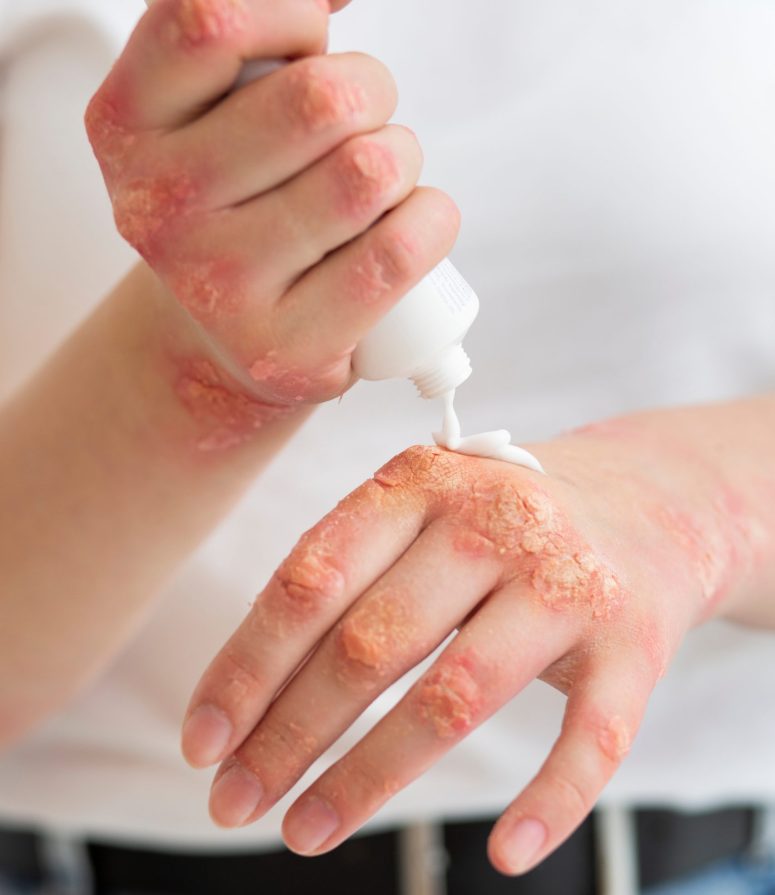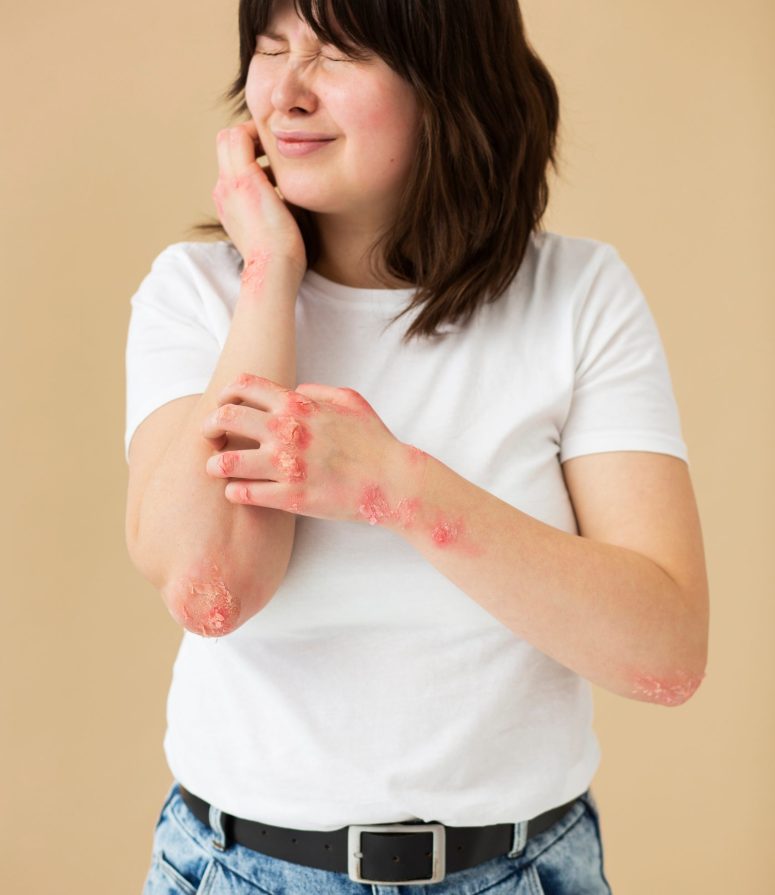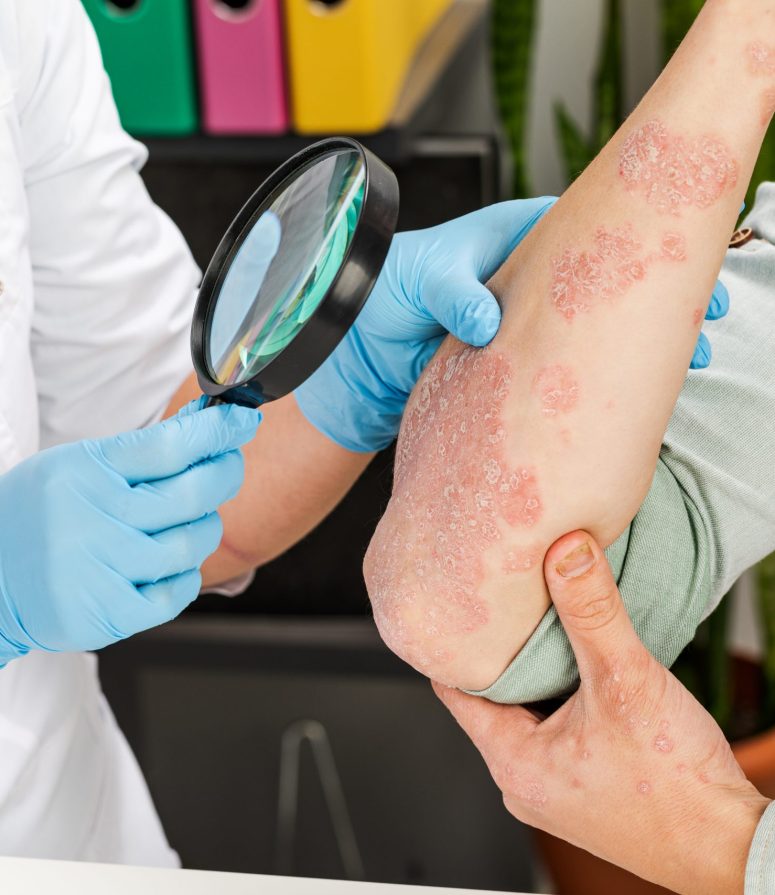Psoriasis Treatment in Venice, FL
Psoriasis is a chronic skin condition that can significantly impact your daily life and emotional well-being. It can take over every aspect, including your self-esteem. You may choose the clothes you wear based on your triggers and skin health. You may schedule social engagements around flare-ups. Psoriasis can affect your job, your relationships, and even your family planning. Proper psoriasis treatment can enhance overall skin health and improve the quality of life for individuals living with psoriasis.
For Psoriasis Treatment In Venice, FL, Contact Us
Psoriasis is a skin condition that impacts the lives of millions. The National Psoriasis Foundation reports that in the US alone, 7.5 million adults live with it. If you are one of them, medical dermatology provides a range of therapeutic options to manage the symptoms of psoriasis. Understanding the various treatment options will empower you as you partner with a board-certified dermatologist at Venice Avenue Dermatology in Florida.

Psoriasis and Treatment: Why It’s So Complex?
Psoriasis is characterized by the rapid turnover of skin cells, which extends beyond what is visible to the naked eye. The buildup of cells creates thick, scaly plaques that lead to systemic inflammation, discomfort, and self-consciousness.
Psoriasis is one of several autoimmune diseases that affect the skin. Also on that list are:
‣ Eczema
‣ Lupus
‣ Dermatomyositis
‣ Vitiligo
‣ Scleroderma
‣ Lupus
‣ Dermatomyositis
‣ Vitiligo
‣ Scleroderma
Autoimmune diseases, such as these, occur when the immune system attacks healthy cells, causing damage and inflammation. In psoriasis, antigens erroneously activate T-cells, particularly Th17 and Th22. They produce cytokines, which are the key drivers of inflammation that cause damage to skin and joints.
Additionally, regulatory T-cells, which are responsible for suppressing inflammation, malfunction in individuals with psoriasis. That dysfunction, along with the release of pro-inflammatory cytokines, compels the inflammation and excessive cell growth that characterize psoriasis.
The fast multiplication of skin cells yields lesions known as plaques that appear on the body. These plaques can grow anywhere, but target points tend to be:
‣ Scalp
‣ Elbows
‣ Knees
‣ Elbows
‣ Knees
Plaque buildup over key joints, such as the elbows and knees, can affect their range of motion, impacting daily life.
Common Psoriasis Subtypes and Symptoms
Psoriasis presents in different forms.
Plaque Psoriasis
The most prevalent form of this skin condition, plaque psoriasis, is characterized by red, raised patches or plaques often associated with the illness. Plaques can become covered with silvery scales and usually appear on the knees, scalp, elbows, or lower back. Plaque psoriasis treatment will depend on the location and severity of the disease.
Inverse Psoriasis
This type of psoriasis presents in the folds as smooth, shiny, and inflamed skin. It can appear in armpits, under the breasts, and in the groin.
Erythrodermic Psoriasis
The least common form of psoriasis, erythrodermic, features a large, scaly rash that covers the entire body. The treatment is exhaustive and may require hospitalization.
Nail Psoriasis
This form of psoriasis only affects the fingernails and toenails. It can lead to pitting, discoloration, and prolific cell growth. It typically accompanies another type of psoriasis, usually plaque. Nail psoriasis treatment may include topical applications targeted at the nails.
Guttate Psoriasis
This version of the skin condition is more common in children and young adults. Characteristics of guttate psoriasis include drop-shaped red spots that tend to appear on the trunk and appendages. There is evidence to suggest that infections, such as strep throat, may trigger guttate psoriasis.
Pustular Psoriasis
Pustular psoriasis features pus-filled blisters usually on the palms of the hands or soles of the feet. The pustules often develop in patches, becoming clearly defined over time. Pustular psoriasis is relatively rare and may occur due to an infection or as a result of withdrawal from a medication.
Psoriatic Arthritis
Psoriatic arthritis is a painful condition that involves joint inflammation and stiffness. It primarily affects those with another form of psoriasis.
Symptoms of Psoriasis
The symptoms of psoriasis will depend on the type, but in general, they might include:
‣ Patches of plaques or thick, raised skin Itching
‣ Red, purple, or brown patches of skin
‣ Dry skin that might crack and bleed
‣ Changes in the nails
‣ Silvery white buildup of dead skin cells
‣ Flaking skin
‣ Irritation and burning in the skin
‣ Red, purple, or brown patches of skin
‣ Dry skin that might crack and bleed
‣ Changes in the nails
‣ Silvery white buildup of dead skin cells
‣ Flaking skin
‣ Irritation and burning in the skin

What Causes Psoriasis to Flare?
It’s unclear why some people develop psoriasis. Studies indicate a mix of genetic and environmental factors likely causes psoriasis. Lifestyle factors can also trigger it.
Environmental and Lifestyle Triggers
While it is unclear why psoriasis develops, there are some common triggers, such as:
‣ Infections—Evidence shows streptococcal infections in the throat, in particular, can trigger this condition.
‣ Skin Trauma—A common trigger is what medical professionals refer to as the Koebner phenomenon.
‣ Skin Trauma—A common trigger is what medical professionals refer to as the Koebner phenomenon.
‣ Psoriasis can appear in areas where there is trauma to the skin, such as a cut or sunburn.
‣ Weather—Climate can also be a significant factor. Dry air tends to worsen the condition. Humid environments, on the other hand, can help manage the symptoms.
‣ Medication—Certain medications, including lithium, antimalarial drugs, and ACE inhibitors to lower ‣ blood pressure, can trigger flare-ups or worsen existing psoriasis.
‣ Stress—Stress triggers many chronic skin conditions, including psoriasis.
‣ Weather—Climate can also be a significant factor. Dry air tends to worsen the condition. Humid environments, on the other hand, can help manage the symptoms.
‣ Medication—Certain medications, including lithium, antimalarial drugs, and ACE inhibitors to lower ‣ blood pressure, can trigger flare-ups or worsen existing psoriasis.
‣ Stress—Stress triggers many chronic skin conditions, including psoriasis.
Lifestyle factors can also contribute to the development of psoriasis. Smoking, for example, is a well-defined risk factor for this disease.
Diet is another potential trigger. Certain foods can cause inflammation, such as those high in saturated and trans fats. Along the same line, obesity and a lack of exercise can exacerbate psoriasis symptoms.
Genetics and Comorbid Conditions
Psoriasis is associated with a number of comorbidities, such as:
‣ Cardiovascular disease
‣ Metabolic disorders
‣ Inflammatory bowel disease (IBS)
‣ Anxiety and other mental health conditions
‣ Certain malignant cancers
‣ Metabolic disorders
‣ Inflammatory bowel disease (IBS)
‣ Anxiety and other mental health conditions
‣ Certain malignant cancers
A prevailing factor in psoriasis is systemic inflammation. Studies indicate that inflammation is a common element in most comorbidities, as well.
There is also a genetic component to psoriasis. One study found a genetic link in 60-90% of the cases studied. The connection may be genes associated with the immune system and its regulation.
For Psoriasis Treatment In Venice, FL, Contact Us
A Personalized, Evidence-Based Treatment for Psoriasis
Venice Avenue Dermatology, servicing Venice, Sarasota, and surrounding areas, offers a comprehensive approach to dermatology care. Our multipronged strategy for psoriasis treatment in Venice, FL, includes topical, injectable, and oral medications, as well as phototherapy.
We provide an accurate subtype-specific diagnosis. That allows us to tailor the treatment for psoriasis to your specific needs.
Stepwise Psoriasis Treatment Planning: From Topicals to Advanced Therapies
The stepwise, personalized treatment ladders we provide span from topical therapies to phototherapy and biologics for optimized control of flare-ups. The first line of defense is usually a topical therapy that you apply directly to the skin to reduce inflammation and slow cell growth
In-Office Narrow-Band UVB Phototherapy for Targeted Relief
Photo or light therapy uses ultraviolet (UV) light to target affected areas of the skin, slowing cell growth and reducing inflammation. It has proven effective for moderate to severe psoriasis.
It is not the right option for someone with a history of skin cancer like melanoma, or a condition that causes sensitivity to light, such as lupus. The dermatologist might require regular skin cancer screenings as part of phototherapy treatment.
Advanced Laser Therapy for Resistant Plaques
Laser therapy targets resistant plaques with a beam of UVB light at a wavelength absorbed by keratinocytes and T-cells. These are present in high quantities in resistant plaques.
Systemic and Biologic Treatments When Needed
Systemic medications that help control moderate to severe psoriasis can include potent immunosuppressants, such as methotrexate. Acitretin, another common systemic drug, helps to normalize skin growth.
Biologic and biosimilar drugs are injectable medications administered via a shot or IV infusion. Developed in living cells, a biologic medication targets a specific part of the immune system. For psoriasis, biologics block proteins or T-cells.

Why Patients Trust Venice Avenue Dermatology for Psoriasis Disease Treatment
Venice Avenue Dermatology offers comprehensive dermatological care to residents of Florida, serving Sarasota and Charlotte counties.
In-House Phototherapy — No Outside Referrals
Our patients benefit from our in-house phototherapy suites for their psoriasis treatments. There is no need to travel to a third-party treatment center or to get a referral.
Same-Week Appointments and Continuity of Care
You can book a same-week appointment when you experience flare-ups. The consistency ensures our patients have a seamless healthcare experience with full continuity of care.
Whole-Person Care That Respects Your Experience
Our dermatology practice takes a holistic approach to managing psoriasis, treating both physical symptoms and emotional well-being. Treating your whole body means incorporating both medication and lifestyle changes into a comprehensive care strategy that takes into account your unique experiences and personal goals.
For Psoriasis Treatment In Venice, FL, Contact Us
Treatment for Psoriasis | Why Choose a Clinical Dermatology Team?
Choosing the right team is crucial when facing a chronic skin condition like psoriasis. A specialized clinical dermatology team provides evidence-based care tailored to meet your individual needs.
Subtype-Specific Plans for Scalp, Nail, and Plaque Psoriasis
Effective care requires a tailored approach based on the subtype, severity, and location of your psoriasis, as well as treatment that works best for each type. Managing each subtype with a separate plan controls individual flare-ups.
Improved Comfort, Appearance, and Quality of Life
A clinical dermatology team takes into account how psoriasis impacts your daily activities, emotional well-being, and quality of life. They can offer advanced therapies that reduce discomfort, minimize any visible plaques, and help manage your symptoms effectively and conveniently.
Request Your Personalized Plan for Psoriasis Treatment in Venice, FL
Get the personalized dermatology care you need. Schedule online or call our office today for psoriasis treatment in Venice FL, serving Venice, Nokomis, Englewood, Sarasota, and surrounding areas.
